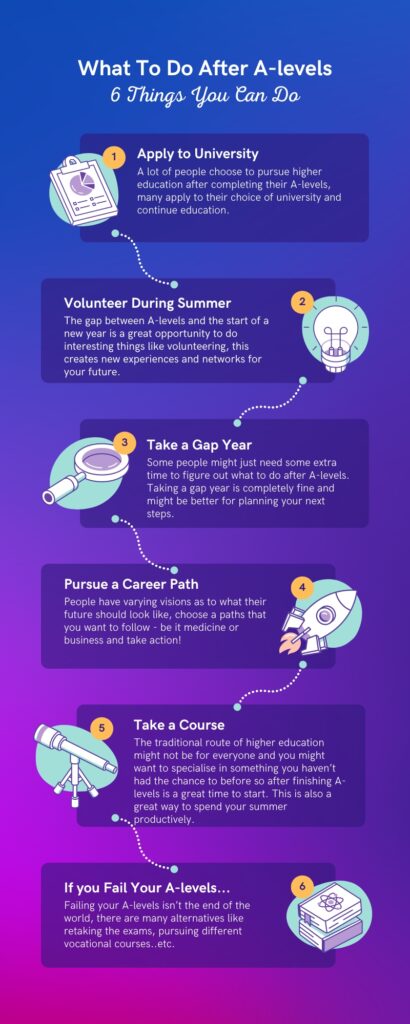After you final A-Levels, you might feel a mix of relief and anticipation. You’ve successfully navigated the rigours of A-Level courses, but now you stand at a crossroads, contemplating the vast horizon of possibilities that lie ahead. “What to do after A-Levels?” is a question that resonates with many students, echoing the uncertainty and excitement of choosing the next step on your educational and career journey.
This important moment is not just about deciding whether to continue with further education; it’s about understanding the breadth of opportunities available to you, from pursuing higher education to exploring alternative pathways that diverge from the traditional university route. Whether you’re considering university, pondering a gap year, or looking into vocational training, this article is your guide for navigating life after A-Levels.
Understanding Your Options After A-Levels
The Path to Higher Education
Once A-Levels are behind you, the traditional route of pursuing higher education looms as a prominent path for many. Deciding what to do after A-levels and before you start university involves more than just choosing to continue your education; it’s about making decisions that will shape your future. Universities offer a variety of courses that cater to varied interests, from the arts and humanities to the sciences and engineering. The journey to selecting the right course and institution is as much about knowing yourself as it is about understanding what each university has to offer. Here are a few things to consider:
Identifying Your Passion and Goals
The first step in this journey is to reflect on your interests, strengths, and long-term career aspirations. Consider the subjects you enjoyed most during your A-Levels and think about how they might translate into a degree course or a future job. Do you envision yourself in a lab, conducting research? Or perhaps you’re drawn to the dynamic world of business and finance? Aligning your course of study with your passions and career goals is crucial for long-term satisfaction and success.
Researching Universities and Courses
With your interests in mind, begin researching universities that offer programs aligning with your goals. Look beyond the prestige and rankings; consider the course content, teaching methods, faculty expertise, and the opportunities for practical experience, such as internships and placements. University open days, virtual tours, and online forums offer valuable insights into campus life and the academic environment, helping you gauge whether a university feels like the right fit for you.
Considering the Location and Campus Life
The location of the university can significantly impact your overall experience. Do you prefer the vibrancy of a city campus or the tranquillity of a rural setting? Consider how the location aligns with your lifestyle preferences and career opportunities in your chosen field. Additionally, explore the extracurricular activities, societies, and support services available on campus. These aspects of university life can enhance your personal development and broaden your social and professional networks.
Application Process and Entry Requirements
Once you’ve shortlisted your preferred courses and institutions, pay close attention to the application deadlines and entry requirements. Crafting a compelling personal statement that highlights your achievements, experiences, and motivation for choosing the course is a critical component of your application. Moreover, understanding the specific entry requirements, such as grades and subject prerequisites, will help you realistically assess your chances of admission and prepare accordingly.
Choosing the right course and university is a decision that requires careful consideration and thorough research. By aligning your interests with the opportunities offered by higher education institutions, you’ll be well-positioned to embark on a fulfilling academic and professional journey. Remember, the path to higher education is not just about earning a degree; it’s about setting the foundation for your future career and personal growth.

Aran A.
Maths | English Tutor
Student at UNIVERSITY OF CAMBRIDGE
£20 Per session
Book Free TrialMaking the Most of Your Summer After A-levels
The summer following your A-Levels is a prime opportunity to enrich yourself personally and professionally. Here are strategies to ensure a productive summer:
1. Internships – Secure an internship in your area of interest. It’s a practical way to apply what you’ve learned and get a feel for the professional environment. Even short-term internships can significantly bolster your CV and give you insights into your chosen field.
2. Part-Time Jobs – Taking on a part-time job can instill a strong work ethic, improve time management, and enhance interpersonal skills. Jobs in retail, hospitality, or any sector can provide valuable life lessons and financial independence.
3. Volunteering – Giving back to the community through volunteering can be immensely rewarding. It’s an excellent way to develop soft skills, meet people with similar interests, and make a positive impact. Plus, it adds a commendable aspect to your university application or resume.
4. Exploring Personal Projects – Utilise this time to dive into projects you’re passionate about. Whether it’s starting a blog, engaging in creative arts, or initiating a startup, pursuing personal projects can be fulfilling and enlightening.
This summer offers a unique pause before you embark on your next academic or professional adventure. Choose activities that align with your future goals and personal growth, preparing you for the exciting journey ahead.

Alternatives to University
For many students, the journey after A-Levels doesn’t necessarily lead to a university campus. Exploring “what to do after A levels not uni” unveils a world of opportunities that align with various career paths, skill sets, and personal preferences. Vocational training, apprenticeships, and diploma courses stand out as valuable alternatives, offering practical experience, skill development, and a quicker entry into the workforce. Let’s delve into these options to understand how they can shape your future.
1. Vocational Training
Vocational courses are designed to equip students with the practical skills and knowledge required for specific jobs. These programs are often more focused and shorter in duration than traditional degree courses, making them an excellent choice for students eager to enter the workforce. Fields such as construction, culinary arts, and beauty therapy often have robust vocational training programs.
2. Apprenticeships
Apprenticeships offer a unique blend of work and study, allowing you to gain hands-on experience in your chosen field while earning a wage. This route not only provides you with the practical skills employers look for but also offers the opportunity to gain industry-recognised qualifications. Whether it’s in engineering, IT, or creative media, apprenticeships can pave the way for a successful career without the need for a university degree.
3. Diploma Courses
Diploma programs offer specialised training in a wide range of fields, from business and finance to healthcare and technology. These courses tend to be more practical and career-oriented than degree programs, with a shorter duration that allows for a faster transition into the job market. Diplomas can also serve as a stepping stone to higher education, should you decide to pursue a degree later on.
Each of these paths provides a distinct set of advantages, including the development of specific skill sets, work experience, and potentially lower costs compared to university education. They cater to those who have a clear idea of their career goals or prefer a more hands-on approach to learning.
Specialised Career Paths – Pursuing a Career in Medicine
Embarking on a medical career is a commendable and ambitious goal, requiring dedication, resilience, and a clear understanding of the path ahead. For A-Level students wondering “what to do after A levels to become a doctor,” here are the essential steps to navigate this challenging yet rewarding journey.
1. Undergraduate Medical Degree (MBBS/BDS) – The first step is securing a place in a medical school to pursue an undergraduate degree in medicine (MBBS) or dentistry (BDS). This typically involves meeting specific A-Level grade requirements, especially in sciences, and passing entrance exams such as the UCAT or BMAT in the UK.
2. Foundation Training – Upon completing your medical degree, you’ll enter a two-year foundation program where you rotate through different medical specialties. This phase is crucial for gaining broad clinical experience and deciding on your area of interest.
3. Specialty Training – After foundation training, you’ll choose a specialty area and undergo further training ranging from three to eight years, depending on the field. This period is characterised by intense learning, exams, and hands-on experience in your chosen specialty.
4. Registration and Practice – Finally, after completing your specialty training, you’ll need to register with a professional body, such as the General Medical Council (GMC) in the UK, to practice as a doctor. Continuous professional development is also a requirement to stay updated with medical advancements and maintain your license.

Specialised Career Paths – Entrepreneurship and the Job Market
For those inclined towards business or eager to enter the workforce directly after A-Levels, “what to do after finishing A levels” offers a plethora of opportunities. Here are some tips for aspiring entrepreneurs and job seekers.
1. Research and Plan – Every successful business starts with a solid plan. Research the market, understand your audience, and outline your business model. For those looking to join the workforce, identify industries and roles that align with your skills and interests.
2. Gain Experience – Internships, part-time jobs, and volunteering can provide invaluable experience and insight into your chosen field. For entrepreneurs, this means understanding the ins and outs of running a business, from finance to marketing.
3. Network – Building a strong professional network is crucial, whether you’re starting a business or looking for a job. Attend industry events, join relevant online forums, and connect with professionals on platforms like LinkedIn.
4. Utilise Resources – Take advantage of resources available to young entrepreneurs and job seekers, including business incubators, career counseling, and online courses to enhance your skills.
5. Be Persistent -Success in entrepreneurship and the job market requires resilience. Be prepared for setbacks and view them as learning opportunities. Persistence and adaptability are key to overcoming challenges.
Whether pursuing a career in medicine or venturing into entrepreneurship and the job market, the path after A-Levels is filled with opportunities for growth and success. By following these steps and staying committed to your goals, you can navigate the journey ahead with confidence and determination.

What to Do If You Fail A-levels?
Receiving A-Level results that fall short of expectations can be a disheartening experience, casting shadows of doubt on future plans. However, it’s crucial to remember that this setback does not define your potential or limit your prospects. For students pondering “what to do after failing A levels,” here are strategies to navigate this challenge and pave a path forward.
1. Reflect and Reassess
Take time to process your emotions and reflect on your A-Level journey. Consider the factors that may have impacted your performance and use these insights to inform your next steps. It’s also a valuable opportunity to reassess your goals and explore alternative career paths that align with your skills and interests.
2. Retake Exams
One of the most direct ways to address disappointing A-Level results is by retaking exams. This option requires careful consideration of the subjects to retake and an honest assessment of your readiness to commit to additional study. Retaking exams can not only improve your grades but also demonstrate your resilience and dedication to future universities or employers.
3. Explore Alternative Admissions
Many universities and colleges offer alternative admission routes for students who haven’t met the traditional entry requirements. Foundation courses, for instance, provide a pathway to undergraduate study, focusing on building the knowledge and skills needed for your chosen degree. Similarly, access courses are designed for students looking to enter higher education without the conventional qualifications.
4. Consider Vocational or Diploma Courses
Vocational training and diploma courses offer practical and focused education tailored to specific careers. These alternatives can be particularly appealing if you have a clear idea of the profession you wish to pursue and are eager to enter the workforce or gain hands-on experience.
5. Seek Advice and Support
Navigating post-A-Level options can be overwhelming, especially after experiencing disappointment. Seeking advice from career counselors, teachers, or mentors can provide clarity and open your eyes to opportunities you may not have considered. Additionally, support from family and friends can bolster your confidence and motivate you to pursue your next steps.
6. Stay Positive and Persistent
It’s essential to maintain a positive outlook and keep pushing forward. Every setback is an opportunity to learn, grow, and emerge stronger. Embrace the journey ahead with an open mind and a determination to succeed, regardless of the obstacles you may face.
Bouncing back from A-Level disappointment requires resilience, adaptability, and a willingness to explore alternative paths. By reassessing your goals, considering retakes or alternative admissions, and seeking advice and support, you can overcome this setback and chart a course toward a successful and fulfilling future. Remember, your A-Level results are just one chapter in your story, and many more opportunities await on the horizon.

Kora F.
Maths | Chemistry | Biology Tutor
Student at UNIVERSITY OF LEEDS
£17 Per session
Book Free TrialFinal Thoughts
The journey after A-Levels is rich with possibilities, each offering a unique path towards personal and professional fulfillment. From higher education and apprenticeships to diving straight into the workforce or entrepreneurship, the key lies in choosing a path that aligns with your passions and career ambitions. Remember, there’s no universal right choice—only what’s right for you, based on your interests and goals.
Should you find yourself in need of guidance or looking to improve your grades for university admission, seeking assistance from A-level tutors can provide the support and expertise necessary to navigate these decisions effectively. They can offer personalised advice, help strengthen your understanding of subjects, and prepare you for any retakes or further education requirements.
We encourage you to explore all your options, conduct thorough research, and consult with advisors, mentors, and A-level tutors who can offer insights and support. Your journey post-A-Levels is just beginning, and with the right resources and a clear vision, you’re set to make informed decisions that pave the way to a rewarding future.








